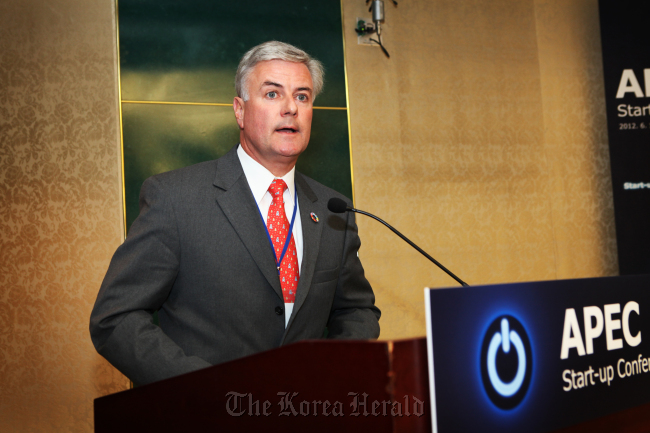A U.S. senior researcher said Monday that young entrepreneurial communities are the driving force behind net new job growth, and world governments should focus on creating start up-friendly policies in the future.
Speaking on the sidelines of the APEC Start-up Conference 2012, which opened at the COEX center in southern Seoul on Monday, senior fellow for the Kauffman Foundation Jonathan Ortmans stressed the importance of governments taking a more collaborative role in helping these new and young firms grow.
“Governments need to focus on the policies and the rules and the incentives, (rather than on) the creation of programs,” he said.
According to Ortmans, almost all the net new jobs in major Western economies are coming from firms less than five years old.
“This data is prevalent not just in the U.S. but emerging out of the World Bank and the OECD and other international organizations (as well),” he said.
 |
Jonathan Ortmans |
Rather than a top-down approach, where governments devise specific projects for these communities, startups work best when they are able to work from the ground up, according to the Kauffman Foundation’s senior fellow.
These communities also share common characteristics across the globe, he said.
“They’re socially motivated. Their motivation for doing this is that they want to do something good, as well as do something well,” Ortmans said.
He also said that members of these groups have great informal networking skills, which play an important role in the success of a new startup business.
Other factors that come into play include their creative mindset and sense of fun, Ortmans said. He also serves as president of the Global Entrepreneurship Week, which has been held annually since 2008 to help nurture groups of innovative business thinkers.
In the near future, Korea should continue focusing on nuturing its young talent, according to Ortmans.
“Since 2008, (Korea) has already adopted the notion that startups are important,” he said, and referenced the growing numbers of high school and university programs that promote entrepreneurship in the country.
Korea should also use large corporations such as Samsung Electronics as a role model, because from a foreign perspective, it’s a “large corporation that feels like a startup and remains creative,” he said.
This creative spirit helps large businesses like Samsung Electronics stay competitive against industry giants such as Apple. Similar companies such as Canada’s RIM has not been able to weather these challenges in the mobile phone industry due to their more inflexible approach, he said.
Ortmans said that his non-profit foundation is currently studying the science behind what makes these companies successful, he said.
Additionally, it’s not so important whether these fledging startup communities survive after five years, according to Ortmans. Rather, it’s really about people, networks and ideas, he said.
“They’re disrupting markets, they’re unleashing ideas and innovations, and the ideas can be acquired by someone else or the ideas can be reformed to a new vehicle.”
By Renee Park (
renee@heraldcorp.com)





![[Exclusive] Hyundai Mobis eyes closer ties with BYD](http://res.heraldm.com/phpwas/restmb_idxmake.php?idx=644&simg=/content/image/2024/11/25/20241125050044_0.jpg)
![[Herald Review] 'Gangnam B-Side' combines social realism with masterful suspense, performance](http://res.heraldm.com/phpwas/restmb_idxmake.php?idx=644&simg=/content/image/2024/11/25/20241125050072_0.jpg)

